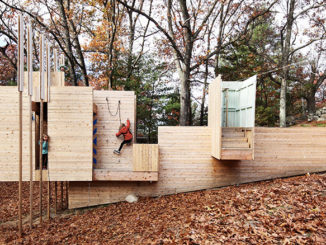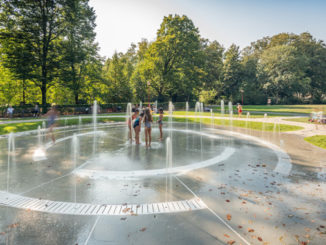After I recently published the Work from Home tips, I received a few requests for tips for those working from home with children. There are many landscape architects who have families with varying situations such as a single parent, a partner working in essential services, two working parents and so on. The following is a guide for parents with children working from home, please keep in mind that your country and/or workplace culture along with parenting style may differ.
Let your work know and manage expectations
The hardest will be trying to maintain standard hours, emails, collaboration sessions, meetings, team management, etc. You should let your company know you have children and request advice on how flexible they are about your work hours, role, etc. The reaction from your company or manager will obviously vary depending on the business culture and your role in the company. It is important to let people know your availability and contact methods.
Seek flexible hours
Many people will be trying to work at home with children and you may need to request working flexible hours whether they are earlier, later in the day or shorter periods such as 1-2 hours sessions rather than 4, 6 or 8 straight hours).
Learn controls for Video Conferencing software
Whether you are using Zoom, Teams, Skype, or another platform it will make life easier if you know how to mute or turn off the video. You will at times need to mute or join a meeting with no video due to the background noise or holding a child.
Bring your children to a meeting
It may be hard to get them to stay still people, however, people are understanding that during these times that the line between your home life and work-life will blur and get used to hearing or seeing children during video calls.
Keep a daily school routine
Depending on the school curriculum (directed or self-directed) you need to try and keep the daily routine going from the waking up, getting ready, starting lessons, playtime, lunch, lessons, etc.
Prepare and follow the curriculum but be flexible with format and location
Many governments and schools have provided an online (remote) learning curriculum and should be followed. If your school hasn’t provided a curriculum then there are many online resources provided by education departments, libraries and textbook distributors such as Scholastic who have provided online tools for teaching children at home. These are country-specific so you may need to seek out resources for your country.
Sometimes, it can be hard for some children to pay attention to an online school with only online interaction. Follow the school guidelines but you may need and format so may be able to can mix up the format to education through role-play, science experiments, etc. Also, take lessons and activities to your garden or balcony to have a change of scene.
Online playgroups and storytime
Parents are trying to maintain a sense of normalcy for their children during the lockdown period and setting up play sessions or storytime with other children and parents can help reconnect with school friends. Parents may be able to take turns for storytime or game playing such as charades, lego challenge, reading aloud, singing and more.
Search and Online resources
There is a lot of information out there on the internet about remote learning, activities for children for various grades. Start with your school, then the local state/provincial education department and then textbook distributors and so on.
ASLA has created some activity books for kids and also teens/adults about landscape architecture.
Compare notes
Many parents are dealing with the same situation, set aside a time to connect with someone else in your workplace, school group to compare notes, ideas and lean on each other for support.
Be informed and try to minimise exposure
You need to be informed as a parent and a citizen, but try not to fixate or get drawn into the numbers and detail of COVID-19. Turn off the news notifications and disconnect from the 24-hour news cycle, stay away from the endless comment streams on social media. The more you get involved the more you will get stressed and your children will pick up on your stress.
Seek Support and Reach Out
Your partner is your key supporter and your first person to lean on, but you also need to maintain communication with each other and make sure you are both mentally healthy. If you don’t have a partner then reach out to friends and family to seek advice. Remember to maintain connections with friends and family through facetime, skype, or phone calls so you can hear and connect with your support network of people. Also, remember to reach out on a regular basis as support is a two-way street and everyone needs support during these times.
If you feel it is getting to hard for you please reach out for assistance such as the National Alliance on Mental Illness (USA) , Mind (UK), Beyond Blue (Australia), Here to Help (Canada), Singapore Association for Mental Health.
Take a break, Find quiet (me) time and fun activities
Remember that you need to take breaks, find quiet time to reflect or meditate and also remember have fun with your family. Take this time to cherish the fun and happy moments with your family.
Take solace and remember this will end
Take solace that living through a pandemic is not normal and this is new to most of us. Every person (especially parents) will experience moments of weakness or fear or trepidation or guilt and there is nothing wrong with it. People are resilient and these are hard times but remember this will end and you will be able to go back outside beyond your garden and local park to explore and learn with your children.
Resources
Twinkl – https://www.twinkl.com
Crayola – https://www.crayola.com/lesson-plans/
Scholastic – https://www.scholastic.com/teachers/teaching-tools/articles/resources/scholastic-learn-at-home–free-resources-for-school-closures.html
Atlantic – How Parents Can Keep Kids Busy (and Learning) in Quarantine
https://www.theatlantic.com/family/archive/2020/03/activities-kids-coronavirus-quarantine/608110/
ABC Education (Australia) https://education.abc.net.au/home#!/home
PBS Learning Media (USA) https://www.pbslearningmedia.org/
BBC Bitesize (UK) https://www.bbc.co.uk/bitesize
Canada Governemnt – http://www.edu.gov.on.ca/eng/parents/howcanihelp.html
ASLA Activity books – https://www.asla.org/activitybooks/

Article Written by Damian Holmes is the Founder and Editor of WLA.
Cover Image – Flickr User – waynewalterberry
DISCLAIMER: This article is for educational purposes only. The content is intended only to provide a summary and general overview on matters of interest. It’s not intended to be comprehensive, nor to constitute advice. You should always obtain professional or legal advice, appropriate to your own circumstances, before acting or relying on any of the above content.



